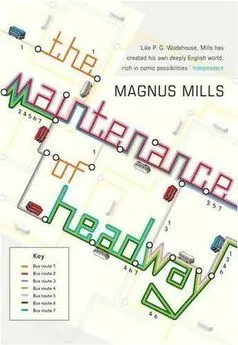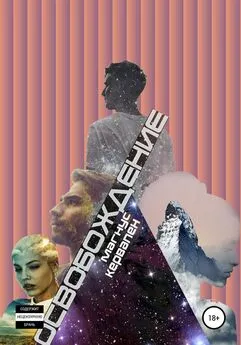Magnus Mills - The Maintenance of Headway
- Название:The Maintenance of Headway
- Автор:
- Жанр:
- Издательство:Bloomsbury UK
- Год:2009
- ISBN:нет данных
- Рейтинг:
- Избранное:Добавить в избранное
-
Отзывы:
-
Ваша оценка:
Magnus Mills - The Maintenance of Headway краткое содержание
It's a matter of procedure,' I explained. 'Strictly for the record. You don't get sacked from this job unless you did what Thompson did.' 'What did he do then?' 'We never mention it.' In Magnus Mills' brilliant short novel he transports us into the bizarre world of the bus drivers who take us to work, to the supermarket, to the match and home again. It is a strange but all too real universe in which 'the timetable' and 'maintenance of headway' are sacred, but where the routes can change with the click of an inspector's fingers and the helpless passengers are secondary. The journey from the southern outpost to the arch, the circus and the cross will seem as familiar as your regular route, but then Magnus Mills shows you the almost religious fervour which lies behind it, and how it is fine to be a little bit late but utterly unforgivable to be a moment early. 'To write one unique book is a rare achievement. The ability to produce several is truly special.' Independent
The Maintenance of Headway - читать онлайн бесплатно полную версию (весь текст целиком)
Интервал:
Закладка:
None of these stories offered any solace to Jeff. He sat at the table nursing his tea and contemplating his fate.
“One thing’s for certain,” I said. “You won’t get the sack.”
“No,” said Jeff. “You told me that before.”
“To get the sack you’d have to do what Thompson did.”
“Yes, you told me.”
“Thompson?” said Edward. “I don’t remember him.”
Seven
There had been further sightings of the articulated bus. Several times of late it had been seen among the traffic flowing slowly down the bejewelled thoroughfare. Jeff spotted it circumnavigating the arch on a Wednesday morning during the quiet spell. Observant tourists took photographs of it at the circus. Then, one lunchtime, a few of us watched from the canteen window as the vehicle made its stately way past the garage in the direction of the southern outpost. The trials were obviously nearing fruition, and as we resumed our places at the table there was much speculation about what the future held.
“Buses are an evolving species,” announced Edward. “We’ve come a long way since the horse-drawn variety.”
“I suppose the next phase will be a double-deck articulated bus,” I suggested. (The model currently undergoing tests was a single-decker.)
“Surely it would be too big,” said Jeff. “The sewers would most likely collapse under the weight.”
“Buses can never be too big,” said Edward. “Not in this country.”
“Why?”
“Because people in this country don’t like sitting next to other people. Especially strangers. When it comes to buses, the more space the better. That’s why double-deckers were invented in the first place.”
“So why were single-deckers brought in?” enquired Davy. “I’ve often wondered.”
Edward gave him a penetrating look before replying.
“Low bridges,” he said at length. “During the industrial era they laid down miles of railway and built bridges everywhere. Buses had to go all round the houses to avoid them.”
“Oh, yeah,” said Davy. “Low bridges.”
“The bane of the double-decker,” I remarked.
“Indeed,” said Edward. “The situation was tolerated for decades, then eventually someone suggested introducing single-deckers. Can you imagine the reaction? There was a public outcry!”
“I’m not surprised.”
“The traditionalists were in uproar. Nowadays we take single-deckers for granted, but at that time they were thought to be quite rudimentary. I doubt if the Reverend Birkett would even have recognised them as proper buses.”
“No, I suppose not.”
Edward was referring to the Rev. W.E. Birkett: naturalist, progressive thinker, amateur musician and, of course, creator of the VPB.
The genesis of the VPB was well known. It had begun life as a series of drawings in a storybook the Rev. Birkett prepared for his children one snowy Christmas, years ago. This told the tale of a resolute bus on a mission to deliver some presents which Santa had left behind. Only as an afterthought did Birkett submit his sketches to the Board of Transport. It so happened that the design committee was seeking a replacement for the ‘old heavies’ and Birkett’s ideas fitted the bill perfectly. The gentle curves of the bus were entirely in keeping with the age of austerity in which the Board presided. The new vehicles were commissioned at once and the Rev. Birkett soon became a household name. Meanwhile, the VPB [Venerable Platform Bus] won the accolade of ‘national treasure’. It featured many notable innovations, not least the fact that the bodywork comprised a metal alloy which rendered it completely rustproof. There was much more as well. The driver in his cab had all-round vision through a myriad of windows. The gearbox was automatic with ‘smooth’ manual override. The flooring was ‘sure-grip’ rubber. There was a sturdy safety pole in the centre of the boarding platform. The saloon windows could be wound open or closed according to the individual desires of the passengers. Finally, it had a heater which worked properly. Each vehicle was painted red and stencilled with its own serial number; also the words METROPOLITAN BOARD OF TRANSPORT.
The VPB heralded the golden age of the ‘characterful bus conductor’. These individuals could often be seen performing on their platforms as if they were turns at the theatre, entertaining their passengers with no end of helpful yet amusing announcements. Some, it goes without saying, were more successful than others. There was once a conductor called Borrowdale who thought it would be of general interest to describe the various attributes of the bus during the journey.
“This bus consists of a lightweight timber frame clad with a single layer of tinplate,” he proclaimed on one occasion. “It is presently conveying its maximum payload of sixty-eight human beings.”
Such disquieting observations had a tendency to empty the vehicle rather than attract passengers. However, he was quite correct about the lightweight timber frame: if your bus was packed to the gunwales and you drove round a sharp bend you could clearly hear it creaking under the strain.
Gunter was another ‘character’, though he had no interest whatsoever in the needs of his people. Instead, the bus was run wholly to his own requirements. If he considered the weather too cold, for example, he went round closing all the windows, deaf to the wishes of any passengers who wanted them open. This was especially so in the upper saloon, which he preferred to be filled with cigarette smoke rather than fresh air. Likewise if someone asked for the heater to be switched on, but it didn’t suit him, it remained switched off. Gunter liked to show who was in charge of the bus, whereas other conductors acted as if they had just come along for the ride.
Broadly speaking, the VPB was a very sociable bus. A common sight in the bejewelled thoroughfare was a conductor on his platform deep in conversation with the driver of the bus immediately behind. (Such conversations were best carried out when both vehicles were stationary.) Sometimes there would be a whole column of buses held up for a while at traffic lights, allowing messages to be passed from one end of the line to the other. Usually these messages related to the latest cricket or football scores, but occasionally they warned of inspectors who’d been spotted lurking in certain locations.
This host of assorted aspects made the VPB very popular indeed. It was a world-famous, double-decker bus, and by comparison the single-decker paled into insignificance.
“What about trees?” said Jeff.
“What about them?”
“‘When trees hold sway, buses keep a low profile’.”
“Well, of course,” Edward conceded. “You’ve just quoted one of the oldest sayings in the book. Certainly, the single-decker earned its rightful place in the menagerie of buses.”
“Did it ever pose a threat to the VPB?”
“Never,” said Edward. “That dubious honour fell to the advent of pneumatic doors.”
He glanced at his watch, stood up and walked away from the table, leaving the rest of us to ponder his words.
“I thought Edward favoured doors on buses,” said Jeff.
“Yes,” I said. “He does.”
“So what did he mean by ‘dubious honour’?”
“He was a reluctant convert,” I explained. “He still has his doubts.”
“Oh.”
“Well, I’m glad there are doors on buses,” said Davy. “Imagine driving along the bejewelled thoroughfare without any. There’d be people piling on every time you pulled up at the traffic lights.”
“Yeah.”
“Then you’ve got those long bus stops which take three buses at a time. If you couldn’t keep the doors shut you’d have sheer anarchy. It would be nothing less than a free-for-all.”
“Funny enough, I don’t mind how many people get on my bus,” said Jeff. “It’s getting rid of them again that’s the problem.”
We all agreed about that. Dropping people off was a drag, the trouble being that the rear exit doors would only operate if you stopped and applied the hand brake. By contrast, the front doors swished open at the mere touch of a foot pedal. My personal preference was for a double-decker bus with just one set of doors at the front. There were still a number of these buses at sundry outlying garages, but lately they were becoming few and far between.
“Why didn’t they equip the VPB with doors?” said Jeff. “Then they could have had the best of both worlds.”
“Don’t ask me,” I said. “That remains one of the great unanswered questions.”
Eight
The road was clogged with slow-moving traffic. I’d been sitting behind the same lorry for almost half an hour as we inched glacially towards the southern outpost. On the back of this lorry was a sign that said: IF YOU CAN’T SEE MY MIRRORS I CAN’T SEE YOU.
I had read these words so many times during the past thirty minutes that they’d become stuck in my head. I’d even set them to music and convinced myself I had the makings of a pop song:
If you can’t see my mirrors
I can’t see you any more
I can’t see you…any more
If you believe in mirrors
You won’t see me any more
You won’t see me…any more
All I needed now was an agent.
Sitting in a bus composing songs might seem pointless, but there was nothing else to do. My people had long since departed, having finally summoned up the courage to ask me to let them out of the bus. Now I was quite alone, and had to entertain myself somehow. As a matter of fact I couldn’t see his mirrors, but in truth I didn’t care any more. I was right up his arse, as we used to say, and that was where I was staying for the foreseeable future. The queue of vehicles appeared to go on forever. Periodically, we’d all start moving forward and hopes would be raised. Then after a few yards we’d all stop again. About ten minutes previously the cab radio had woken from its slumbers with a ‘bus-wide’ announcement concerning a burst water main near the southern outpost. I remembered the antics of the man with the large key and decided he must be responsible for the present situation.
More time passed, and eventually a bus came along travelling in the opposite direction. Driving it was Coleen. She stopped beside me and spoke through her window.
“Fucking chaos down there,” she said. “I’m forty-five minutes late.”
“Any officials?” I asked.
“Only Baker,” she replied. “He’s running round like a headless chicken.”
After Coleen had gone I reflected on her words. There were many inspectors who flapped at the first sign of crisis, and Baker was indeed one of them. It required someone of the calibre of Breslin to sort things out properly. I wondered if he was riding to the rescue at this very moment. Probably not, I concluded. All the inspectors travelled by bus, and the southbound buses weren’t going anywhere. The service on this particular route was sporadic at best. Today it was virtually non-existent.
After an age of progressing at little more than walking speed I arrived at the point where the mains had burst. It was exactly the same place I’d been held up the other day: a disaster area with water flooding all over the road and water company vans parked everywhere. I could also see the matter wasn’t being helped by the temporary lights that had recently been rigged up. These were meant to alleviate the problem by regulating the flow of traffic. However, it was immediately clear to me that the timing was all wrong. The only passable section of road was narrow and very muddy. Accordingly, some motorists were advancing with extreme care and caution. Whoever was in charge of the lights had made no allowance for this, so that they turned from green to red while vehicles were still only halfway. Traffic then began coming through from the other end. As usual nobody would yield to anyone else, and the result was stalemate.
Читать дальшеИнтервал:
Закладка:





![Джеймс Купер - Пионеры, или У истоков Саскуиханны [The Pioneers, or The sources of the Susquehannah]](/books/1066142/dzhejms-kuper-pionery-ili-u-istokov-saskuihanny-t.webp)




